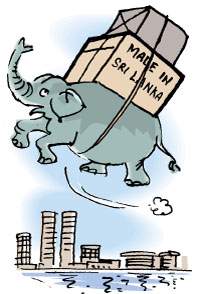| The Sunday Times Economic Analysis By the Economist | ||||||
| |
||||||
Importance of focusing more on trade than on aid Without a good trade performance, even aid could be a burden. Most aid is in the form of loans rather then grants and there would be a leakage of aid expenditure for imports. Further, most of the aid expenditure is not likely to generate export earnings. The fact is that despite a growth in exports in the first four months of this year, the import growth has been much larger, resulting in an increasing trade deficit. This has been the pattern in the past 25 years. Either export increases have been choked by a more than commensurate growth in imports or exports have fallen and consequently we have suffered a big deficit. In the first four months exports grew by 12.8 percent compared to our performance during the same period of last year. The main source of the export growth has been the resurgence in industrial exports that grew by 17 percent. Garments, the main export, accounting for 64 percent of industrial exports and 49 percent of our total current exports grew by 10 per cent. Agricultural exports, on the other hand, have not performed badly owing to the difficulties tea exports faced early this year. Tea production too has declined by 3.7 percent in the first five months. The problem this year is mainly on the side of our imports. While the export growth resulted in export earnings of US$ 1502 million, imports grew to US$ 2068 million. The result is a trade deficit of US$ 566 million. This deficit is 12.5 percent larger than the deficit of last year for the same period. There was an expectation that the growth in exports would soon be matched by an increase in exports. The argument was that the higher imports of raw material and capital goods were mainly for increased production of exports. Is this a delusion? All three categories of imports increased. Consumer imports increased by 9 percent, while intermediate or raw material imports grew by 18 per cent. Capital goods imports too grew by 12 percent. Though all three categories of imports grew, the most pronounced increase in imports was in the intermediate goods category. These statistics are not likely to sound alarm bells as it is most likely that there would be a balance of payments surplus this year. This is owing to increased service incomes, higher remittances and capital inflows. The expectation is that there would be considerable official inflows of capital this year. Already there have also been large inflows of private capital as well for portfolio investment. This situation is likely to lead to complacency with respect to the trade performance. What must be underscored is that a trade surplus has greater long run significance for the economy. In the case of capital inflows there are contingent liabilities for the future. Loans have to be repaid with interest, private capital is volatile and capital outflows could be larger in later years. Therefore the balance of payments surplus should not lull us into complacency. The trade balance is of vital significance to the economy. An interesting contrast to our complacency is the serious concern of the US to increase its exports, despite trade being of lesser significance to the US economy. This is captured by the words of U.S. Senator Max Baucus, Ranking Member of the Senate Finance Committee, at a New America Foundation lecture given last Thursday, July 24. "I am concerned that the United States lacks an overall strategy when it comes to our trade policy with Asia. Asia holds six of our twelve largest trading partners and more than half of the world's population. Many U.S. businesses view Asian markets as their most promising for future growth. Despite this, our efforts over the last couple of years have been mainly focused outside of Asia. We have failed to build upon the successes we achieved in the 1990's. The United States is a Pacific country. Our economic future in large part depends upon our trade with Asia. I hope that we can take steps soon to re-energize America's trade policy with Asia." If the US is so concerned about its trade with Asia, should we not be concerned? And "trade", we must say, is an euphemism for exports. Can we re-energise our trade policy to reduce the growing trade deficit and hopefully generate a surplus at least in some years? |
||||||
Copyright © 2001 Wijeya Newspapers
Ltd. All rights reserved. |
 A
good trade performance is vital for the country's economic growth.
Being a trade dependent economy it is crucial that our exports generate
an adequate income to pay for our imports. Conversely, it is important
that our imports do not increase to an extent that the growth in
exports is negated by higher imports. While there is celebration
of the amount of aid that has been committed to the country, mainly
for reconstruction of devastated areas, we do not focus adequately
on improving our trade performance.
A
good trade performance is vital for the country's economic growth.
Being a trade dependent economy it is crucial that our exports generate
an adequate income to pay for our imports. Conversely, it is important
that our imports do not increase to an extent that the growth in
exports is negated by higher imports. While there is celebration
of the amount of aid that has been committed to the country, mainly
for reconstruction of devastated areas, we do not focus adequately
on improving our trade performance.